Tia Silverthorne Bach's Blog, page 115
May 4, 2011
Writing Resources for the Serious Writer: Five I Use Consistently . . .
by Angela Silverthorne, aka Mom and co-author
I've been writing since I was a young girl. It was my favorite pastime. For me, writing and reading went together−one enhancing the other. As I became more serious about my work, I started looking for books and resources to help me grow stronger in my writing. Here are 5 books that I suggest you examine.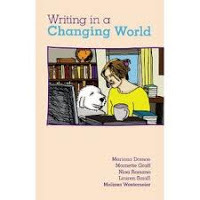 1.
Writing in a Changing World
by five authors of the Screw Iowa! writers group is the newest in my group of favorites. Damon, Graff, Romano, Small and Westemeier bring my theory on writing to the forefront. You can study all the books on writing you want, but the finale is searching out and finding the right community of writers for support, encouragement and critiquing. Writers use to think their craft needed to be done in isolation. It might work for some, but oftentimes the project would end in frustration or eventually abandoned. Finding a strong writers group will encourage you, but more than that, it will push you to write to your potential. The book highlights this and offers much more on improving your craft, troubleshooting, conflict resolution, critiquing in action and more.
1.
Writing in a Changing World
by five authors of the Screw Iowa! writers group is the newest in my group of favorites. Damon, Graff, Romano, Small and Westemeier bring my theory on writing to the forefront. You can study all the books on writing you want, but the finale is searching out and finding the right community of writers for support, encouragement and critiquing. Writers use to think their craft needed to be done in isolation. It might work for some, but oftentimes the project would end in frustration or eventually abandoned. Finding a strong writers group will encourage you, but more than that, it will push you to write to your potential. The book highlights this and offers much more on improving your craft, troubleshooting, conflict resolution, critiquing in action and more.

2. Teaching English Creatively by John H. Bushman is a classic. I still use this book to set the mood and tone for writing in a particular genre, i.e. young adult verses adult.
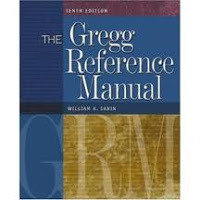 3.
The Gregg Reference Manual
by William A. Sabin is an indispensable guide to style, grammar, usage and formatting. Some call this the "writing bible." I certainly think it is an essential resource book.
3.
The Gregg Reference Manual
by William A. Sabin is an indispensable guide to style, grammar, usage and formatting. Some call this the "writing bible." I certainly think it is an essential resource book.
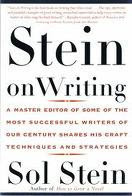
4. Stein on Writing by Sol Stein is a must. It is the fix it manual. If you want to know how to correct something flawed, how to improve your writing or create exciting pieces, invest in this book.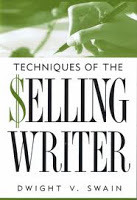
5. Techniques of the Selling Writer by Dwight V. Swain is my latest find, and I am impressed. This book provides an elementary vernacular on background, insights, and specific procedures needed by all beginning writers. It's the perfect book to learn more about character development, story revision and editing.

I've been writing since I was a young girl. It was my favorite pastime. For me, writing and reading went together−one enhancing the other. As I became more serious about my work, I started looking for books and resources to help me grow stronger in my writing. Here are 5 books that I suggest you examine.
 1.
Writing in a Changing World
by five authors of the Screw Iowa! writers group is the newest in my group of favorites. Damon, Graff, Romano, Small and Westemeier bring my theory on writing to the forefront. You can study all the books on writing you want, but the finale is searching out and finding the right community of writers for support, encouragement and critiquing. Writers use to think their craft needed to be done in isolation. It might work for some, but oftentimes the project would end in frustration or eventually abandoned. Finding a strong writers group will encourage you, but more than that, it will push you to write to your potential. The book highlights this and offers much more on improving your craft, troubleshooting, conflict resolution, critiquing in action and more.
1.
Writing in a Changing World
by five authors of the Screw Iowa! writers group is the newest in my group of favorites. Damon, Graff, Romano, Small and Westemeier bring my theory on writing to the forefront. You can study all the books on writing you want, but the finale is searching out and finding the right community of writers for support, encouragement and critiquing. Writers use to think their craft needed to be done in isolation. It might work for some, but oftentimes the project would end in frustration or eventually abandoned. Finding a strong writers group will encourage you, but more than that, it will push you to write to your potential. The book highlights this and offers much more on improving your craft, troubleshooting, conflict resolution, critiquing in action and more.

2. Teaching English Creatively by John H. Bushman is a classic. I still use this book to set the mood and tone for writing in a particular genre, i.e. young adult verses adult.
 3.
The Gregg Reference Manual
by William A. Sabin is an indispensable guide to style, grammar, usage and formatting. Some call this the "writing bible." I certainly think it is an essential resource book.
3.
The Gregg Reference Manual
by William A. Sabin is an indispensable guide to style, grammar, usage and formatting. Some call this the "writing bible." I certainly think it is an essential resource book.

4. Stein on Writing by Sol Stein is a must. It is the fix it manual. If you want to know how to correct something flawed, how to improve your writing or create exciting pieces, invest in this book.

5. Techniques of the Selling Writer by Dwight V. Swain is my latest find, and I am impressed. This book provides an elementary vernacular on background, insights, and specific procedures needed by all beginning writers. It's the perfect book to learn more about character development, story revision and editing.
Published on May 04, 2011 05:47
May 3, 2011
Lifetime TV's "The Balancing Act"
Mom and I filmed a segment on Lifetime TV's morning talk show "The Balancing Act" (airs Monday - Friday 7am EST/Pacific and 6am Central/Mountain) about our novel, Depression Cookies, and being a mother-daughter writing team. What a lovely, yet completely nerve-wracking experience!
Come back and check out more details about our experience (and the list of errors NOT to make on television) here on Thursday, 5/5.
For now, some pictures . . .
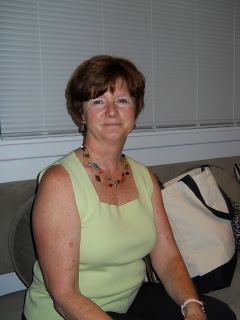 Mom before makeup - I hope to I take after her!
Mom before makeup - I hope to I take after her!
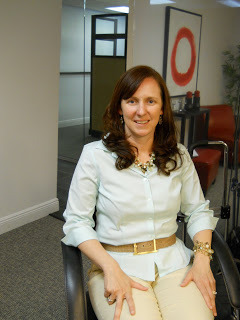 Tia pre-makeup
Tia pre-makeup
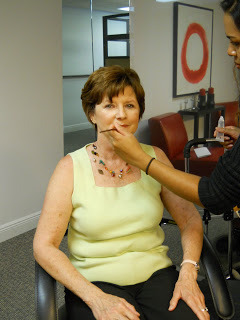 Mom even more beautiful
Mom even more beautiful
 Post makeup and ready to tape
Post makeup and ready to tape
 All done and quite relieved!
All done and quite relieved!
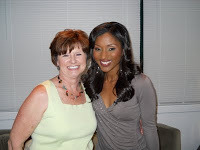 Mom with host, Danielle Knox
Mom with host, Danielle Knox
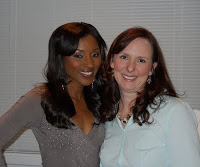 Tia with host, Danielle Knox
Tia with host, Danielle Knox
Tune in Thursday for more of our adventures.
Come back and check out more details about our experience (and the list of errors NOT to make on television) here on Thursday, 5/5.
For now, some pictures . . .
 Mom before makeup - I hope to I take after her!
Mom before makeup - I hope to I take after her! Tia pre-makeup
Tia pre-makeup Mom even more beautiful
Mom even more beautiful  Post makeup and ready to tape
Post makeup and ready to tape All done and quite relieved!
All done and quite relieved!
 Mom with host, Danielle Knox
Mom with host, Danielle Knox
 Tia with host, Danielle Knox
Tia with host, Danielle Knox Tune in Thursday for more of our adventures.
Published on May 03, 2011 16:25
Book Clubs: Excellent for Readers and Authors
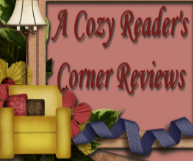 Mom and I intially set out to write a novel about corporate moving and the issues faced by the families who move, like ours did, every 2-3 years. Of course, the book became so much more.
Mom and I intially set out to write a novel about corporate moving and the issues faced by the families who move, like ours did, every 2-3 years. Of course, the book became so much more. We are first and foremost READERS! I've said it many times on this blog . . . I support all genres and love to read. As does Mom. When Tiffany Schlarman of http://acozyreaderscorner.blogspot.com/ asked me to do a guest post, I knew I wanted to cover the importance of book clubs. Not only are they an excellent source for book lovers to find quality books to discuss, but they are an excellent resource for authors as well.
Check out my guest post at http://acozyreaderscorner.blogspot.com/2011/05/book-clubs-wonderful-marketing-tool.html.
Also, please take a peek at our Book Club tab. We'll have pictures from our latest Depression Cookies book club up soon. Thanks again to my friends in San Diego, especially Debbie Lanpheer who hosted. I miss you all!
Later today: A bit about our Lifetime TV appearance yesterday followed by a post on Thursday, 5/5 with details about the experience including things NOT to do on television!
Published on May 03, 2011 11:54
May 2, 2011
Lessons from the Maryland Writers' Conference
A quick update: Mom and I are in Ft. Lauderdale filming our segment for Lifetime TV's "The Balancing Act" so my lovely sister (and Webmaster) is making sure our blog post is published today. Thanks Dana! I don't know what I would do without my family.
On April 2, 2011, I attended the Maryland Writers' Association Writers' Conference in Baltimore, Maryland. This was my first writing conference. I learned so much and met a lot of fascinating people. I can't wait to attend more conferences and workshops. I've definitely caught the bug.
The highlights:
1. Traditional Publishing Does Not Put Many Marketing Dollars into Newbie Authors
Even if you are fortunate enough to get an agent who then sells your manuscript to a traditional publishing house, you will still be responsible for promoting yourself! Publishing houses are not going to put a lot of money into an untested, unproven author or book. This really surprised me. I thought the whole point of getting into a traditional publishing contract was to have professionals sell your book. It's simply not the case.
2. Social Media is an Excellent Marketing Tool
Authors in this current publishing environment MUST have a presence in Social Media including, but not limited to: Facebook, a website, a blog, LinkedIn, Twitter, and Goodreads. Readers want access to information about a book and its author. Social media is time-consuming, but for the most part it is FREE marketing. However, if you know you won't stay on top of a Twitter account but would enjoy daily blogging, focus your time wisely. Don't spread yourself too thin. This includes participating in sites like LinkedIn, Goodreads, blogs, etc. relevant to your book and industry. Give before you expect to get!
3. If you don't like Marketing/Business, don't publish a book. Enough said.
4. Remember: Editors are Readers
Your reader needs to be constantly craving what happens next, and an editor is no different. Your query and sample pages should be compelling and tease a bit. Your writing should keep offering choices with no immediate resolution.
5. Advice from an Editor (John David Kudrick) a. Write in a white hot line that sizzles b. Show me, don't tell me c. Take the reader there; engage the reader in every possible way
If you wouldn't want the first five pages (what most agents ask for during submissions) to represent your story, don't start with those five pages. He also suggested letting the story flow and THEN editing. I tend to get caught up in revising along the way, and I need to focus on getting the story on paper and then making it better.
6. Plan and Budget for Marketing
First, scour the internet and keep a notebook on marketing ideas based on what others are doing successfully. What appeals to you as a reader? Set a marketing plan and budget and stick to it.
Sample Marketing for Pre-Launch- Send out Advanced Reader Copies (ARCs) for reviews- Submit ARCs to contests- Mail out teaser mini-boks- Blog Tour- Set up Social Media presence
For Release:- Run Sweepstakes/Contest- Launch party- Ramp up Social Media- Cold calls/Bookstore and other Store visits
Post-Launch- Send out materials for next book- Send thank you notes to reviewers and anyone who helped along the way- Book Signings- Create newsletters and send mass emails from "reader" list
Final thoughts: Take your time picking reviewers since you want the right one for your book/genre. Evaluate what is working for your book and ditch what isn't. Spend time on your cover!
Tomorrow: Check back tomorrow for details about our Lifetime visit! Pictures, too.
On April 2, 2011, I attended the Maryland Writers' Association Writers' Conference in Baltimore, Maryland. This was my first writing conference. I learned so much and met a lot of fascinating people. I can't wait to attend more conferences and workshops. I've definitely caught the bug.
The highlights:
1. Traditional Publishing Does Not Put Many Marketing Dollars into Newbie Authors
Even if you are fortunate enough to get an agent who then sells your manuscript to a traditional publishing house, you will still be responsible for promoting yourself! Publishing houses are not going to put a lot of money into an untested, unproven author or book. This really surprised me. I thought the whole point of getting into a traditional publishing contract was to have professionals sell your book. It's simply not the case.
2. Social Media is an Excellent Marketing Tool
Authors in this current publishing environment MUST have a presence in Social Media including, but not limited to: Facebook, a website, a blog, LinkedIn, Twitter, and Goodreads. Readers want access to information about a book and its author. Social media is time-consuming, but for the most part it is FREE marketing. However, if you know you won't stay on top of a Twitter account but would enjoy daily blogging, focus your time wisely. Don't spread yourself too thin. This includes participating in sites like LinkedIn, Goodreads, blogs, etc. relevant to your book and industry. Give before you expect to get!
3. If you don't like Marketing/Business, don't publish a book. Enough said.
4. Remember: Editors are Readers
Your reader needs to be constantly craving what happens next, and an editor is no different. Your query and sample pages should be compelling and tease a bit. Your writing should keep offering choices with no immediate resolution.
5. Advice from an Editor (John David Kudrick) a. Write in a white hot line that sizzles b. Show me, don't tell me c. Take the reader there; engage the reader in every possible way
If you wouldn't want the first five pages (what most agents ask for during submissions) to represent your story, don't start with those five pages. He also suggested letting the story flow and THEN editing. I tend to get caught up in revising along the way, and I need to focus on getting the story on paper and then making it better.
6. Plan and Budget for Marketing
First, scour the internet and keep a notebook on marketing ideas based on what others are doing successfully. What appeals to you as a reader? Set a marketing plan and budget and stick to it.
Sample Marketing for Pre-Launch- Send out Advanced Reader Copies (ARCs) for reviews- Submit ARCs to contests- Mail out teaser mini-boks- Blog Tour- Set up Social Media presence
For Release:- Run Sweepstakes/Contest- Launch party- Ramp up Social Media- Cold calls/Bookstore and other Store visits
Post-Launch- Send out materials for next book- Send thank you notes to reviewers and anyone who helped along the way- Book Signings- Create newsletters and send mass emails from "reader" list
Final thoughts: Take your time picking reviewers since you want the right one for your book/genre. Evaluate what is working for your book and ditch what isn't. Spend time on your cover!
Tomorrow: Check back tomorrow for details about our Lifetime visit! Pictures, too.
Published on May 02, 2011 06:01



